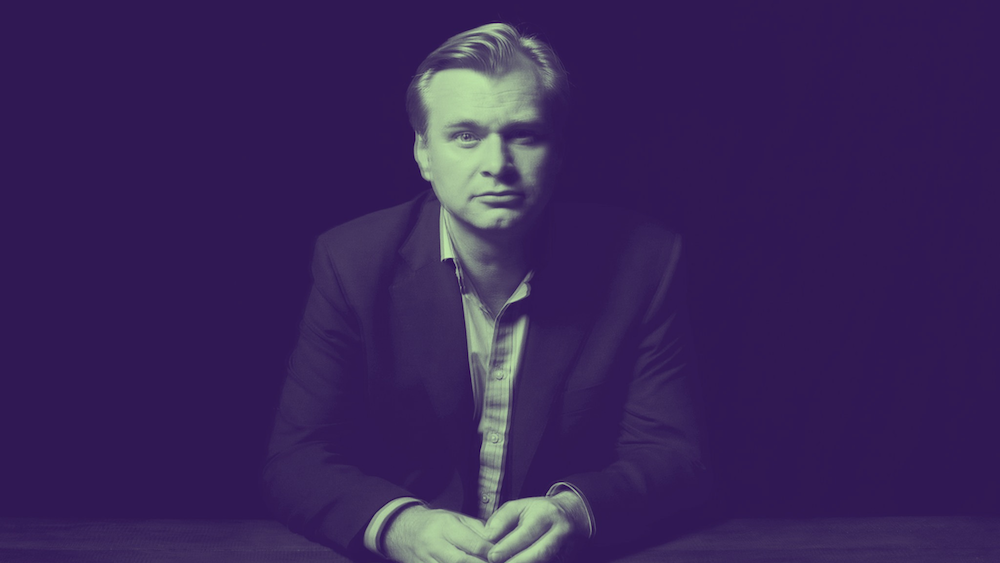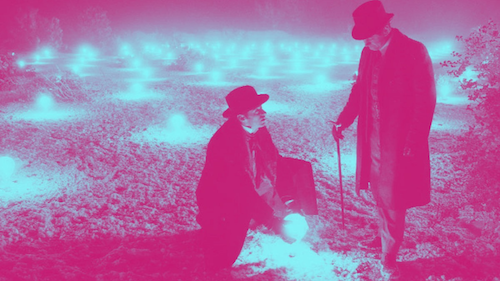Filmography Worship: Ranking Every Christopher Nolan Film
Written by Andreas Babiolakis
Filmography Worship is a series where we review every single feature of filmmakers that have made our Wall of Directors
I think it is safe to say that Christopher Nolan is a generational auteur at this point. His very name becomes a tricky subject of conversation for different cinephile audiences. For some, his works are needlessly complicated to follow: his characters feel quite calculated and inhuman to these viewers. For others, he prioritizes technical achievement and complex action over fundamental storytelling, and he comes off as too commercial for serious cinephiles. Then there are the Nolan obsessives that swear that everything he touches is gold. By this year, with the amount of work Nolan has released, we have that fourth group of people that I am proud to be a part of one that recognizes his ability to bridge mainstream blockbusters with arthouse sensibilities to make a unique style of films that are interesting attempts at their worst and utterly magnificent at their best. With all of this in mind, I do think Nolan may have been overrated and underrated by different circles for many years. He’s not the be-all-end-all of film, but he is far from a scrub or a hack.
I also believe that Nolan is cementing his name amongst the greats more and more, and it is impossible to ignore the magnitude of his craft by now. He has always been transfixed by the many ways the rules of storytelling can be broken, which has been his de facto trait that most would say has defined him the most. I must also bring up how he continuously makes genre films his very own (we will go more into those one by one) which I find maybe even more fascinating than his non-linear, fragmented storytelling devices particularly because he adheres to these genres just enough that they fit in, and yet these films always feel purely like his own. Not every experiment here works, but I would argue most of them do to varying results; a handful are so successful that I would consider them monumental feature films of their time (and even of all time).
With the number of films that do work, it’s safe to say that Nolan is one of the great mavericks of filmmaking; maybe not my personal favourite director ever, but it’s feeling impossible to not bring his name up amongst his peers (something naysayers still refuse to do). His style is often mimicked with results that come nowhere near his finest work (have you noticed that every trailer feels the exact same since Inception’s dropped years ago?). It’s time to dissect the films of one of cinema’s most calculated, brainy, gargantuan filmmakers. Which twists, tricks, and experiments worked the best? Which fell flat? Here are the feature films of Christopher Nolan ranked from worst to best.
12. The Dark Knight Rises
The easiest film to rank here is The Dark Knight Rises, which I find to unquestionably be Nolan’s weakest film. While it is still exciting as a superhero film on the big screen (and it is impossible to not be swept away by the scope and intensity of this picture), The Dark Knight Rises is also inexplicably flawed. Of any major film directed and co-written by a respected and iconic filmmaker, this feature boasts some of the most glaring plot holes I have ever seen, particularly in the final act of the film that feels titanic but has the sensibility of a frog that won’t leave the boiling pot of water: it revels in its own miasmic demise of flaw. I still find The Dark Knight Rises to be an enjoyable film, but it hurts my mind even just remembering: an unfortunate predicament from a filmmaker that usually gives my brain a nice workout. From the impossibility and lack of proof that Bruce Wayne/Batman can even return to Gotham City in any capacity let alone without a trace (and this is only one. of at least a dozen narrative errors) to the forced concepts of torch-passing and self-sacrifice via vigilantism, The Dark Knight Rises is a spectacle that explodes when needed to hide the real fizzling that is going on.
11. Tenet
We take a bit of a leap up in quality here while discussing Tenet because I still quite enjoy this espionage labyrinth. If The Dark Knight Rises wasn’t thought out enough, then Tenet may have the unfortunate fate of being on the other side of the spectrum: it is perhaps too calculated. It is the only time I will agree with the viewers that find Nolan’s films confusing because I still find this chess game to be extremely difficult to follow completely. Nonetheless, I can keep up with Tenet enough to find it not only enjoyable but breathtaking as well, despite its density and coldness. If you are patient with the first hour of world and plot building, Tenet leaps into mind-blowing territory with its manipulation of time, as we experience it flow forwards and backwards at the same time (a concept Nolan has toyed with many times before, but each time he handles it differently, and Tenet is no exception). From this point on, I would say that every Nolan film on this list is more good than bad, and Tenet is a part of this calibre. It may be his most challenging film that gets a bit lost in its own devices, but Tenet is also astonishing enough for it to matter.
10. Following
Considering that I’ve ranked Following above two of Nolan’s most expensive projects, I must think highly of his feature film debut. That’s true. This is a shoestring-budget indie film that could have become another director’s magnum opus if it had the right budget. Considering that this was just the start for Nolan is a testament to how endless his imagination would be. I also love that Nolan hasn’t dismissed his first film outright, as he has provided interviews and commentary in hindsight. Following even has the first sense of cinematic confusion that Nolan would never shake off from this point on as an author gets wrapped up in the criminal underworld in ways he cannot predict or protect himself from. The ending twist may be typical now that we know what Nolan is capable of, but for its time it is proof that he was always wanting to be twelve steps ahead of his audience; it’s a reasonable twist nonetheless that will force you to rewatch Following instantly to see where all of the clues are (and most of them are very much there). Limited only by its budget, this indie classic is a portfolio of creativity that got Nolan straight into the film industry, where an untouchable independent film (one of the finest of all time) was the next step.
9. Batman Begins
If The Dark Knight Rises fumbled wrapping up too many expectations, then Batman Begins was just the start: one of Nolan’s most basic films but a fun time nonetheless. This wouldn’t be the first time we had a dark superhero film and not even the first dark Batman film (we have Tim Burton to thank for that), but Batman Begins was already countering the comic book films that were on the rise after their near death at the end of the nineties (we can thank Spider-Man for saving the day, I suppose). On its own, Batman Begins feels like a fun time at the movies, a neat introduction to Bruce Wayne and his alter ego via some pulpy mythology (if anything, the genesis of Batman and all of Wayne’s training feel like the most interesting aspects of the film), and a precursor to what would come next. I wouldn’t call Batman Begins forgettable by any stretch, but I do find it has less replay value than the other Nolan films (unless you want to kick off a marathon of the entire Dark Knight trilogy, that is). However, when I do revisit Batman Begins, I quickly remember how reliable it is as an action film that doesn’t expect much from me, nor does it treat me foolishly. It’s as steady as they come.
8. Insomnia
If you want to bring up the topic of what Nolan’s most underrated film is, Insomnia has to be the answer, in my opinion (apparently Nolan agrees with me). While not as great as the film that preceded it (more on that later), Insomnia is still Nolan’s foray into big-budgeted filmmaking and not once does it feel like a sellout project (to be fair, neither do any of the Batman films, fortunately). Nolan still uses this opportunity to try and figure out the complexities of the human mind, this time during the peak season in Alaska where there is permanent daylight (and our protagonist detective becomes delirious with the titular symptom). The earliest Nolan films are all crime related (maybe where he became a nice fit to take on the then-next Batman project), and some of his latter films fall under the same umbrella ideology. What makes Insomnia feel special is how far it is willing to go with the concept of morality, and it searches a lot more for this answer than even some of Nolan’s biggest features. A strong adaptation of Erik Skjoldbjærg’s film of the same name, Insomnia deserves more love.
7. The Prestige
If Nolan's films are guilty of forcing you out of the loop and making you rely on your own orienteering, then The Prestige is the one case where it literally tells you to pay attention (the start of the film demands that you watch closely). Maybe you listen and scrutinize every edit, shot, and line of dialogue to see where this film about duelling magicians is going to go. Part of The Prestige feels a bit predictable once you follow instructions, but I think Nolan actually accounts for this when he reveals not one but two twists simultaneously; it feels next to impossible to predict both outcomes the first time you watch the film. Nolan never sacrifices his adoration of science even in a film about illusionists and he incorporates basic levels of the subject into the magic tricks here, allowing them to be plausible whilst instilling a sense of wonder in the inventions made all in the name of spectacle. For years I found The Prestige not as jaw-dropping as other Nolan films, but revisiting it recently has shown me that it has both aged well and been more clever than I initially gave it credit for. Even if the twists can be seen from a mile away (if we pretend that is the case), The Prestige is still a gripping story about egotism and perfectionism featuring some of Nolan’s most human characters to date (oddly enough, they’re people whose entire professions are based on them being convincingly inhuman).
6. Interstellar
Nolan’s most emotional film is Interstellar: a look at generational love and divide via wormholes and space travel. While these characters feel a little sterile with their constant spouting of scientific information via frigid delivery, it is impossible not to feel the heart elsewhere, especially via one of Hans Zimmer’s most inspirational scores to date. It can be tough to buy into Interstellar’s version of time travel when we only see one main timeline that is obstructed by future events (it may send you into a downward spiral wondering how we even got here), but I think there is enough commitment that I can suspend disbelief in a film that is really about familial disconnection and the distances one will go to reunite with a loved one. I will never forget seeing the earliest possible screening of Interstellar, where someone was full-on ugly crying throughout the final act; I could only recognize that I felt the same way. It may not make perfect sense or cohesion, but Interstellar pulls at my heartstrings and has me questioning my own relationships every time I watch it (that’s the other thing: I won’t pass up any opportunity to rewatch this beautiful feature). I feel like Interstellar’s legacy will only continue to grow with time.
5. Dunkirk
From this point on, we’re entering the territory where we reach Nolan’s finest features, and I found ranking them quite challenging. I’ll never forget how some critics were calling Dunkirk one of the greatest war films of all time the very weekend it was released, and part of the reason is that they weren’t exactly wrong. This is an exemplary war picture that begs us to examine the concept of fate when everyone’s lives are on the line. With so many soldiers thrown into combat, where is the possibility to direct the course of history? With three timelines happening at once and at different speeds (one week on land, one day at sea, and one hour in the air), and the very moment they converge is a revelatory sequence that is impossible to forget: a massive statement on how much the livelihood of people and nations depend on circumstance. The entire film functions like a flowing river that never lets up; it even sticks the landing after the climax so each storyline has its proper resolution (no matter how bittersweet they can be). Each storyline is fascinating on its own as well, so Dunkirk never feels like a gimmicky feature. If anything, my love for this film may only continue to expand. If it isn’t one of the great war films, it is certainly one of the most unique.
4. The Dark Knight
Batman Begins was expository. The Dark Knight Rises was a juggling act that tried to keep up with expectations. The Dark Knight is just right: the film Batman Begins wanted to be and the one The Dark Knight Rises impossibly had to follow. It is a sequel that is so monumental that it thrives on its own two feet whilst changing superhero films for good and also being one of the great crime thrillers of the twenty-first century. A spiritual tribute to Michael Mann’s Heat through and through, The Dark Knight is a bombastic action film that continuously asks us to find the differences between a tortured vigilante, an anarchistic villain, and a crooked politician: who has society’s best interests at heart? While all three people have their own visions of how Gotham City should be, the actual setting is thrown up in the air in complete disarray with every leader losing in their own way. The Dark Knight challenges us to question what a superhero is, how many justifications are we willing to make for these depictions of fantasy to ring true, and what a realistic take on the genre may look like. The result is a gritty, game-changing opus that still feels unmatched.
3. Inception
Nolan’s answer to heist cinema is one for the ages: an exploration of dreams within dreams within dreams whilst tricking the dreamer into giving up withheld information. The first act is all a setup that introduces you to this fascinating world of dream exploration that Satoshi Kon first handled with Paprika back in 2006. Once you become acquainted with the idea of dream hijacking, Nolan grants you an overwhelming experiment where we get as deep into the subconscious as possible, with as many as four (or debatably five) storylines happening all at once at different speeds; it is breathtakingly pulled off. At the epicentre is an emotional tale of loss, grief, and the punishing of one’s self. Do we try to hide from reality via our psyche? If so, to what extent? A lot is riding on the heist in Inception, and if it doesn’t get pulled off, many will be jeopardized (including the possibility of being imprisoned permanently in the comatose limbo state). I think it is safe by now to call Inception one of the greatest action films of all time, as it boasts stunts and effects as massive as its world-building and wit.
2. Oppenheimer
Despite how recently it was released, it feels impossible to ignore how extraordinary Oppenheimer is right off the bat. During an era where biopics are starting to feel like we are force-feeding ourselves food we are sick and tired of, Oppenheimer is refreshingly brilliant. As it has two concepts happening at once (fission and the dissection of Robert J. Oppenheimer’s legacy, versus fusion and the friction created by his infamy that creates a proper, bigger picture), we also have storylines woven together like a tapestry and the film having a series of cyclical thematic threads (the film itself actually starts where it ends, proving it is an endless, grief-stricken nightmare for Oppenheimer). An urgent warning about the inevitability of doomsday, a thorough examination of one historical figure in such a singular way, and some of Nolan’s most sympathetic storytelling so far, Oppenheimer is instantly a jaw-dropping achievement in a filmography that is already full of those (and yet it feels like one of his finest releases).
1. Memento
These top five films were difficult to pull apart and rank individually, but the top three felt nearly impossible. Inception and Oppenheimer are separated by mere atoms, and Memento sits on top of Nolan’s filmography by a fraction of a hair. What had me placing this peculiar indie film at the very top? Firstly, the screenwriting is the best of any Nolan film and that certainly helps; the usage of two storylines from different time periods happening simultaneously with one being sequenced in reverse is still cinematic magic if I’ve ever seen it. Secondly, it may be chronologically complicated but the story itself is quite simple, making Memento instantly easy to follow the first time you watch it (and allowing you to truly feel like you are a part of the ride while you deduce this neo-noir gem). Once again Nolan is questioning what a moral compass looks like, this time in the mind of someone with short-term memory loss who you instantly fall for (until you learn the ways of an unreliable narrator that is more than happy to decide their own terms and story). Memento is far from the most explosive or technically enriched Christopher Nolan film, but the fact that it keeps up with his largest efforts through principal, creativity, and conceptual strength alone speaks volumes, doesn’t it? With some of his most engaging characters, a tragic story that becomes a narrative maze that has us with mud on our faces by the final sequence, and instant and constant replay value, Memento may very well be the best film Christopher Nolan ever made.
Andreas Babiolakis has a Masters degree in Film and Photography Preservation and Collections Management from Ryerson University, as well as a Bachelors degree in Cinema Studies from York University. His favourite times of year are the Criterion Collection flash sales and the annual Toronto International Film Festival.















